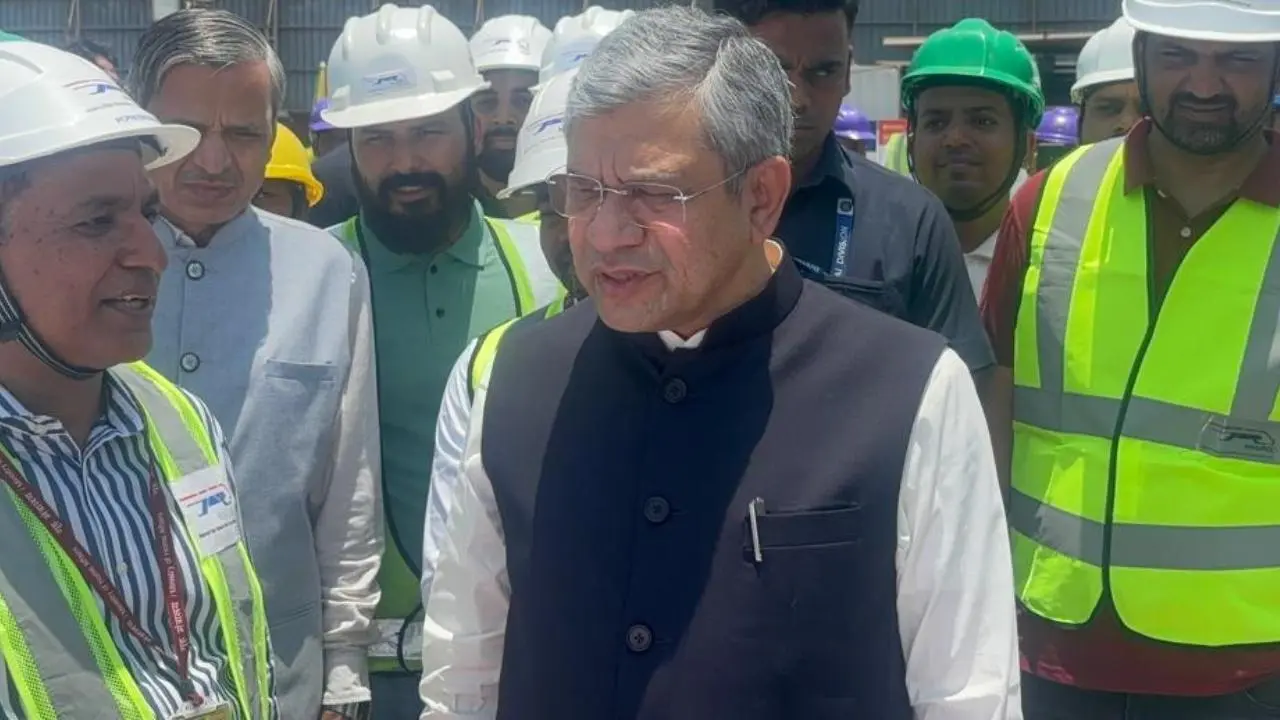Vaishnaw toured the construction site of the underground station at Bandra Kurla Complex (BKC) and assessed the progress being made

Railway Minister Ashwini Vaishnaw (above) inspected the work of the Bullet Train project on Saturday. Pic/Railways
Union Railway Minister Ashwini Vaishnaw on Saturday reviewed the progress of the ambitious Bullet Train project and said that the construction of the train's origin station in Bandra-Kurla Complex (BKC) in Mumbai was progressing very fast, the PTI reported.
Vaishnaw visited the construction site of the underground station at Bandra Kurla Complex (BKC) and assessed the progress of the work completed so far.
According to the PTI, Vaishnaw also inspected ongoing infrastructure works at Panvel and Juinagar railway stations in Navi Mumbai and assessed the progress of key railway and freight projects.
At BKC, Vaishnaw was accompanied by officials from the National High-Speed Rail Corporation Limited (NHSRCL), which is executing the over 500 km-long Mumbai-Ahmedabad Bullet Train project, along with representatives from Central Railway and Western Railway.
Vaishnaw said that the lowest B3 basement level and the strengthening of the station walls have been completed.
"The work at the bullet train's origin station in BKC is progressing very fast. The station wall work has been started, and simultaneously, the tunnel work is progressing very fast," the Railway Minister stated, reported PTI.
Beyond the tunnel portion (Shil Phata), all ongoing works are moving at a high speed in the Maharashtra section following the land acquisition, the minister added.
The minister said a multi-storey structure is planned at the BKC station.
"The operational areas will be located on levels B1 to B3. The B3 will serve as a train parking area, B2 will house operational functions, and B1 with the ground level will serve passengers. Work is underway to build this world-class station," the minister further stated, reported PTI.
NHSRCL officials said that approximately 76 per cent of the excavation work at the BKC bullet train station has been completed.
Following the inspection, the Minister proceeded to Pune, where he was scheduled to flag off two long-distance trains later in the evening.
The total cost of the Mumbai-Ahmedabad High-Speed Rail Corridor project is estimated at Rs 1.08 lakh crore. As per the shareholding arrangement, the Government of India will contribute Rs 10,000 crore, while the states of Gujarat and Maharashtra will each contribute Rs 5,000 crore.
The remaining funding will be provided through a loan from Japan at 0.1 per cent interest.
Maharashtra Chief Minister Devendra Fadnavis had last week said that the bullet train project will become operational by 2028.
Addressing media persons after visiting Panvel railway station, Vaishnaw stated that the government's long-term vision for expanding Mumbai's rail capacity and modernising its stations to meet the demands of the coming decades, reported PTI.
"Prime Minister Narendra Modi has guided us to work with a vision for the next 50 years. In that spirit, we are constructing a major coaching terminal at Panvel, which will serve as an origin point for trains," Vaishnaw said, reported PTI.
Vaishnaw said that the construction of the coaching terminal is advancing rapidly and it is being built to support increased passenger flow and operational efficiency.
He said the Panvel-Karjat suburban rail link, a key component of easing pressure on the Mumbai rail network, is also making steady progress.
Vaishnaw also reviewed the dedicated freight corridor, which he described as being in its final laps of development.
Once operational, it will divert goods trains off the main passenger lines, significantly enhancing the movement of local and express trains in the region.
"The freight corridor's connection to the Jawaharlal Nehru Port Trust (JNPT) is progressing well. This will ease pressure on Mumbai's passenger rail lines and boost logistics efficiency," the Railway Minister added, reported PTI.
The railway minister said that efforts are underway to implement the best international railway technology in India, with Panvel and other nodes in the Mumbai region poised to benefit from these innovations.
"Our goal is not just expansion but transformation, and making Indian Railways more efficient, safer, and future-ready," the minister stated, reported PTI.
(With PTI inputs)
 Subscribe today by clicking the link and stay updated with the latest news!" Click here!
Subscribe today by clicking the link and stay updated with the latest news!" Click here!








